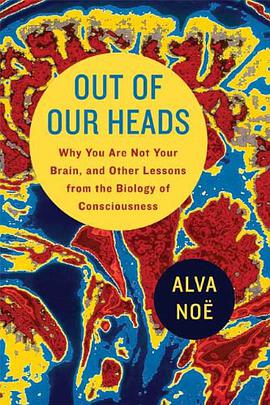

具体描述
Alva Noe is one of a new breed--part philosopher, part cognitive scientist, part neuroscientist--who are radically altering the study of consciousness by asking difficult questions and pointing out obvious flaws in the current science. In "Out of Our Heads," he restates and reexamines the problem of consciousness, and then proposes a startling solution: Do away with the two hundred-year-old paradigm that places consciousness within the confines of the brain. Our culture is obsessed with the brain--how it perceives; how it remembers; how it determines our intelligence, our morality, our likes and our dislikes. It's widely believed that consciousness itself, that Holy Grail of science and philosophy, will soon be given a neural explanation. And yet, after decades of research, only one proposition about how the brain makes us conscious--how it gives rise to sensation, feeling, and subjectivity--has emerged unchallenged: We don't have a clue. In this inventive work, Noe suggests that rather than being something that happens inside us, consciousness is something we do. Debunking an outmoded philosophy that holds the scientific study of consciousness captive, "Out of Our Heads" is a fresh attempt at understanding our minds and how we interact with the world around us. Alva Noe is a professor of philosophy at the University of California, Berkeley, where he is also a member of the Institute of Cognitive and Brain Sciences. His previous book, "Action in Perception," was published in 2004. Alva Noe is one of a new breed--part philosopher, part cognitive scientist, part neuroscientist--who are radically altering the study of consciousness by asking difficult questions and pointing out obvious flaws in the current science. In "Out of Our Heads," he restates and reexamines the problem of consciousness, and then proposes a startling solution: Do away with the two hundred-year-old paradigm that places consciousness within the confines of the brain. Our culture is obsessed with the brain--how it perceives; how it remembers; how it determines our intelligence, our morality, our likes and our dislikes. It's widely believed that consciousness itself, that Holy Grail of science and philosophy, will soon be given a neural explanation. And yet, after decades of research, only one proposition about how the brain makes us conscious--how it gives rise to sensation, feeling, and subjectivity--has emerged unchallenged: We don't have a clue. In this inventive work, Noe suggests that rather than being something that happens inside us, consciousness is something we do. Debunking an outmoded philosophy that holds the scientific study of consciousness captive, "Out of Our Heads" is a fresh attempt at understanding our minds and how we interact with the world around us. "To be conscious, Alva Noe claims, is to be 'awake, aroused, alert, ' and neuroscientists are wrong to imagine that they can reproduce consciousness in a petri dish. A philosopher-scientist, Noe aims to replace neuroscience's reductionism. He compares the development of consciousness to a trickle of water that carves a tiny path in the land; with time, the path draws more water to it, eventually making it impossible for other water not to flow down that path. Similarly, cognitive habits grow in response to our needs and interests. Noe is an alluring writer . . . One comes away from the book agreeing that an 'explanatory gap' separates conscious experience from the simple firing of neurons, that reductionism is indeed dead, yet wondering what accounts for our conscious engagement with the world. Noe's partial answer is summarized in the book's preface: 'Only one proposition about how the brain makes us conscious . . . has emerged unchallenged: we don't have a clue.'"--Ruth Levy Guyer, "The Washington Post" "To be conscious, Alva Noe claims, is to be 'awake, aroused, alert, ' and neuroscientists are wrong to imagine that they can reproduce consciousness in a petri dish. A philosopher-scientist, Noe aims to replace neuroscience's reductionism. He compares the development of consciousness to a trickle of water that carves a tiny path in the land; with time, the path draws more water to it, eventually making it impossible for other water not to flow down that path. Similarly, cognitive habits grow in response to our needs and interests. Noe is an alluring writer . . . One comes away from the book agreeing that an 'explanatory gap' separates conscious experience from the simple firing of neurons, that reductionism is indeed dead, yet wondering what accounts for our conscious engagement with the world. Noe's partial answer is summarized in the book's preface: 'Only one proposition about how the brain makes us conscious . . . has emerged unchallenged: we don't have a clue.'"--Ruth Levy Guyer, "The Washington Post" "Alva Noe, a philosopher at UC Berkeley, argues that consciousness remains a mystery because we've been looking in the wrong place. In his provocative and lucid new book, Noe writes that scientists have been so eager to locate the mind in the brain that they've neglected to consider the possibility that our mind might not be inside our head . . . Then where is it? Don't worry, Noe isn't an old-fashioned Cartesian dualist: He doesn't believe that our consciousness is some metaphysical gift from God. Instead, he suggests that who we are and what we know is inseparable from where we are and what we're doing: 'Consciousness is not something the brain achieves on its own, ' Noe writes. 'Consciousness requires the joint operation of the brain, body and world . . . It is an achievement of the whole animal in its environmental context.' Noe sells this audacious idea with a series of effective metaphors. For instance, he begins the book by comparing consciousness to a dollar bill. He notes that it would be silly to search for the physical correlates of 'monetary value.' After all, the meaning of money isn't in the paper, or the green ink, or the
作者简介
目录信息
读后感
评分
评分
评分
评分
用户评价
相关图书
本站所有内容均为互联网搜索引擎提供的公开搜索信息,本站不存储任何数据与内容,任何内容与数据均与本站无关,如有需要请联系相关搜索引擎包括但不限于百度,google,bing,sogou 等
© 2025 book.quotespace.org All Rights Reserved. 小美书屋 版权所有




















